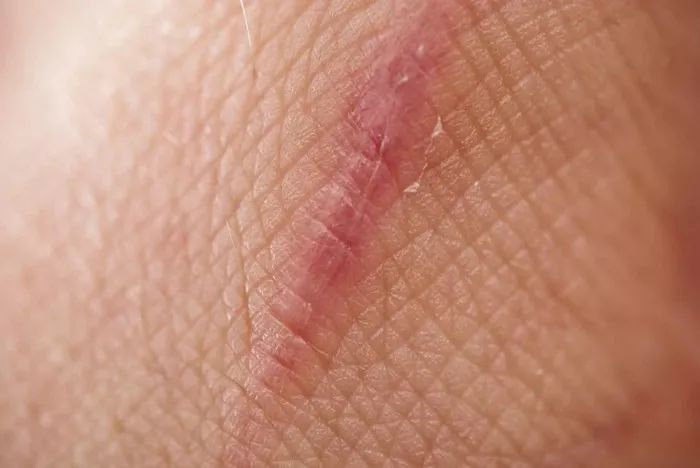Scars are a natural part of the healing process, resulting from injury or surgery. While scars may fade over time, many individuals seek ways to minimize their appearance and promote skin healing. Vitamin E has long been touted as a remedy for scars, with claims of its ability to improve scar appearance and texture. In this article, we explore the scientific evidence behind the use of vitamin E for scars, its potential benefits, and considerations for its use.
Vitamin E
Overview
Vitamin E is a fat-soluble antioxidant that plays a crucial role in protecting cells from oxidative damage caused by free radicals. It exists in various forms, with alpha-tocopherol being the most biologically active form in the human body. Vitamin E is found naturally in certain foods, such as nuts, seeds, vegetable oils, and leafy green vegetables, and is also available in supplement form.
Skin Health Benefits
In addition to its role as an antioxidant, vitamin E is known for its potential benefits for skin health. It is believed to possess anti-inflammatory properties and may help protect the skin from damage caused by ultraviolet (UV) radiation and environmental toxins. Vitamin E is also thought to support skin repair and regeneration, making it a popular ingredient in skincare products and supplements.
The Role of Vitamin E in Scar Healing
Scar Formation Process
Before delving into the efficacy of vitamin E for scar management, it’s important to understand the process of scar formation. When the skin is injured, whether through a cut, burn, or surgical incision, the body initiates a complex healing response. This process involves inflammation, cell proliferation, collagen synthesis, and tissue remodeling, ultimately leading to the formation of scar tissue.
Potential Mechanisms of Action
Proponents of vitamin E for scar healing suggest several potential mechanisms by which it may exert its effects:
Antioxidant Activity: Vitamin E’s antioxidant properties may help neutralize free radicals and reduce oxidative stress in the skin, thereby supporting the healing process and minimizing scar formation.
Anti-Inflammatory Effects: Vitamin E is believed to possess anti-inflammatory properties, which may help reduce inflammation and swelling at the site of injury, potentially leading to less prominent scars.
Collagen Synthesis: Vitamin E may play a role in collagen synthesis, the process by which new collagen fibers are produced to repair damaged skin. By promoting collagen production, vitamin E could contribute to improved wound healing and scar remodeling.
Scientific Evidence
While the theoretical mechanisms of action suggest that vitamin E could benefit scar healing, the scientific evidence supporting its efficacy is mixed and subject to debate. Several studies have investigated the use of topical vitamin E preparations, oral supplements, or both for scar management, with varying results.
Effectiveness of Vitamin E for Scars: What the Research Says
Clinical Studies
Numerous clinical studies have evaluated the efficacy of topical vitamin E preparations, such as creams, oils, and gels, for scar management. While some studies have reported positive outcomes, including improvements in scar appearance and texture, others have found no significant benefit or even adverse effects associated with vitamin E use.
Potential Limitations
One of the primary challenges in studying the effectiveness of topical vitamin E for scars is the variability in study designs, patient populations, and outcome measures. Additionally, the stability and bioavailability of vitamin E in topical formulations can vary, affecting its efficacy. Some individuals may also experience skin irritation or allergic reactions to topical vitamin E products.
Oral Vitamin E Supplements
Clinical Trials
Clinical trials investigating the use of oral vitamin E supplements for scar management have yielded conflicting results. While some studies have reported improvements in scar appearance and symptoms with oral vitamin E supplementation, others have found no significant difference compared to placebo or even an increased risk of adverse effects.
Potential Risks
One concern with oral vitamin E supplementation is the potential for adverse effects, particularly at high doses. Excessive intake of vitamin E can lead to toxicity, characterized by symptoms such as gastrointestinal upset, headache, fatigue, and an increased risk of bleeding. Additionally, some studies have suggested that high-dose vitamin E supplementation may be associated with an elevated risk of cardiovascular events in certain populations.
Overall Considerations
When evaluating the effectiveness of vitamin E for scar management, it’s essential to consider the following factors:
Individual Response: Responses to vitamin E treatment may vary among individuals, depending on factors such as skin type, scar type, and overall health. What works for one person may not necessarily work for another.
Other Treatment Modalities: Vitamin E is just one of many options available for scar management. Other treatments, such as silicone gel sheets, corticosteroid injections, laser therapy, and surgical revision, may also be effective depending on the nature of the scar and individual circumstances.
Safety Concerns: While vitamin E is generally considered safe when used topically or taken orally at recommended doses, high doses may pose risks, particularly for certain populations. It’s essential to consult with a healthcare professional before starting any new supplement regimen, especially during pregnancy or while breastfeeding.
Conclusion
Vitamin E has been widely promoted as a natural remedy for scars, with claims of its ability to improve scar appearance and texture. While some studies suggest potential benefits, the scientific evidence supporting the efficacy of vitamin E for scar management is inconclusive. Clinical studies have yielded mixed results, with some demonstrating positive outcomes and others finding no significant difference compared to placebo.
Ultimately, the effectiveness of vitamin E for scars may vary among individuals, and its use should be approached with caution. While topical vitamin E preparations are generally well-tolerated, oral supplementation may carry risks, particularly at high doses. It’s essential to consider other treatment modalities and consult with a healthcare professional before using vitamin E for scar management. With careful consideration and informed decision-making, individuals can explore various options for scar treatment and find the approach that works best for them.
[inline_related_posts title=”You Might Be Interested In” title_align=”left” style=”list” number=”6″ align=”none” ids=”9466,9378,9305″ by=”categories” orderby=”rand” order=”DESC” hide_thumb=”no” thumb_right=”no” views=”no” date=”yes” grid_columns=”2″ post_type=”” tax=””]
































